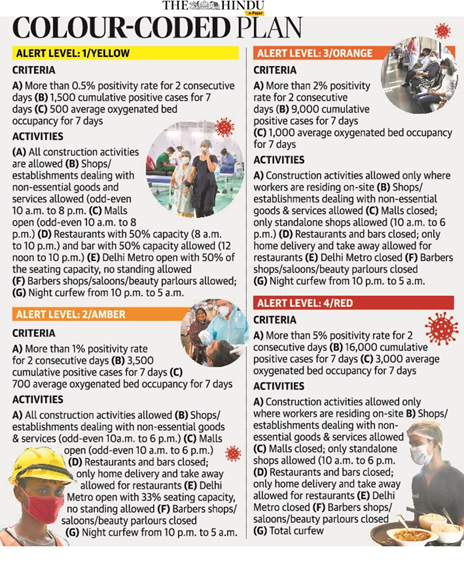(1)(1)-1631703280778.jpeg)
EDEN BLOGS
EMERGENCY’ MEASURES UNDER GRAP |13TH November 2021
13
Nov
(1)(1)-1631703280778.jpeg)
(1)(1)-1631703280778.jpeg)
Syllabus Section: Environment and Ecology ( GS Paper III)
Importance: UPSC Prelims and UPSC Mains
Why in News?
Recently, states in the National Capital Region were directed to be ready to implement actions under the ‘emergency’ category of the Graded Response Action Plan (GRAP) to control air pollution.
About:
Graded Response Action Plan (GRAP):
- GRAP was notified by the Union Environment Ministry in 2017 to fight air pollution, in pursuant to the Supreme Court’s order in the matter of M. C. Mehta vs. Union of India (2016) regarding air quality in the National Capital Region of Delhi.
- GRAP is a set of emergency measures to be taken to reduce the air pollution depending on the level of pollution.
- It has been prepared for implementation under different Air Quality Index (AQI) categories namely, Moderate & Poor, Very Poor, and Severe.
- A new category of “Severe+ or Emergency” has been added.
- Actions under the ‘emergency’ category include stopping of construction activities and odd even vehicle rationing scheme based on number plates of vehicles
- It institutionalised measures to be taken when air quality deteriorates.
- The plan is incremental in nature - therefore, when the air quality moves from ‘Poor’ to ‘Very Poor’, the measures listed under both sections have to be followed.
- It prevents PM10 and PM2.5 levels from going beyond the ‘moderate’ national AQI category.
- The severe+ measures are implemented when the PM2.5 levels cross 300 microgram/cubic metre or PM10 levels cross 500 microgram /cubic metere and persist for 48 hours or more.
Category
Particulate Matter (PM Concentration)
Measures
Severe + or Emergency
- Ambient PM2.5or PM10 concentration: 300µg/m3 or 500 µg/m3 respectively
- Persist for 48 hours or more.
- Stop entry of truck traffic into Delhi (except essential commodities)
- Stop construction activities.
- Introduce odd and even scheme for private vehicles.
- Task Force to take decision on any additional steps including shutting of schools.
Severe
- Ambient PM2.5: more than 250 µg/m3
- PM10: more than 430µg/m3
- Close brick kilns, Hot Mix plants, Stone Crushers.
- Maximize generation of power from existing natural gas-based plants to reduce operation of coal-based power plants in the NCR.
- Intensify public transport services.
- Introduce differential rates to encourage off-peak travel.
- Increase frequency of mechanized cleaning of road and sprinkling of water on roads
Very Poor
- PM2.5: between 121-250µg/m3
- PM10: 351-430 µg/m3
- Stop use of diesel generator sets.
- Increase bus and metro services and increasing frequency of service.
- Stop use of coal/firewood in hotels and open Eateries.
- Alert in newspapers/TV/radio to advise people with respiratory and cardiac patients to avoid polluted areas and restrict outdoor movement.
Moderate to poor
Ambient PM2.5: 61-120 µg/m3
PM10: 101-350 µg/m3 r
- Stop garbage burning in landfills and other places.
- Close/stringently enforce all pollution control regulations in brick kilns and industries.
- Stringently enforce pollution control in thermal power plants through PCB monitoring.
- Ban on firecrackers.
Source: The Hindu


{{doubts.user.firstName}}
{{doubts.createdAt | formatDate}}